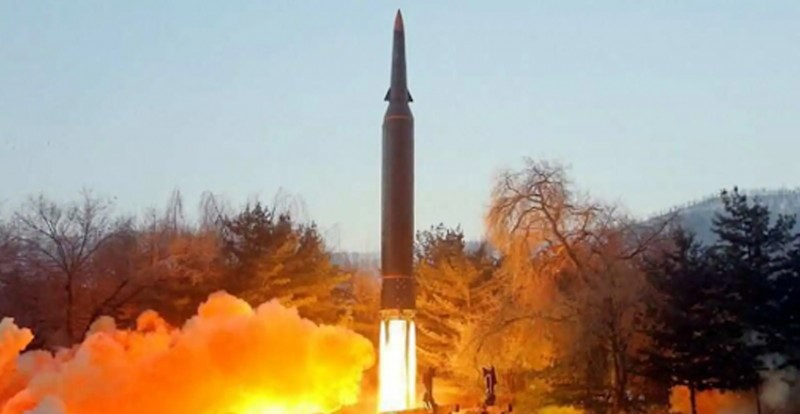
North Korea has achieved a significant milestone in its missile program, as state media reported the successful test-firing of a new hypersonic missile on Wednesday. Leader Kim Jong Un has outlined a strategy to transition the country's missile arsenal to solid-fuel propulsion, marking a departure from conventional liquid-fuel systems.
Despite facing international sanctions, North Korea continues its weapons development unabated. Solid-fuel missiles offer advantages in terms of quicker deployment compared to their liquid-fuel counterparts, according to analysts.
The launch of the intermediate-range ballistic missile (IRBM), named Hwasong-16B, drew condemnation from neighboring South Korea, Japan, and the United States. Kim Jong Un personally oversaw the launch, emphasizing its strategic significance and the advancement of North Korea's defense technology.
Kim highlighted the goal of outfitting North Korea's entire missile range with solid-fuel propulsion, enabling rapid and precise strikes against targets worldwide. However, it remains unclear if solid-fuel missiles will entirely replace liquid-fuel ones in North Korea's arsenal, including its intercontinental ballistic missiles (ICBMs) like the Hwasong-17 and Hwasong-15.
Ankit Panda from the Carnegie Endowment for International Peace noted the strategic advantages of solid-fuel missiles but highlighted potential challenges in their long-term maintenance. He cautioned that imperfections over time could lead to failures during flight.
Decker Eveleth from the James Martin Center for Nonproliferation Studies suggested that the shift to solid-fuel missiles could enhance North Korea's responsiveness in emergencies. This transition might also involve deploying some ICBMs in silos alongside existing mobile launch systems.
North Korea's pursuit of hypersonic missiles aligns with its broader efforts to develop warheads that are difficult to intercept. These hypersonic vehicles travel at speeds exceeding five times the speed of sound, maneuvering at low altitudes to evade defenses.
The recent test follows ground trials of a solid-fuel engine for an intermediate-range hypersonic missile conducted in March, drawing condemnation from Britain for violating UN Security Council resolutions.
India Boosts Naval Presence: 11 Submarines Deployed Amidst China Tensions
Thales Missile Factory in Belfast Ramps Up Production Amid Ukraine War